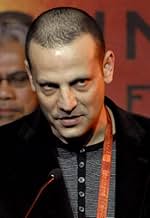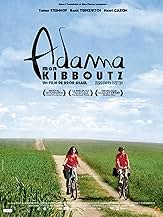Aggiungi una trama nella tua linguaSet in mid-70's, 12-year old Dvir Avni navigates between the equality values of his home-born Kibbutz and the relationship with his undermined mother, whom the Kibbutz members will to denoun... Leggi tuttoSet in mid-70's, 12-year old Dvir Avni navigates between the equality values of his home-born Kibbutz and the relationship with his undermined mother, whom the Kibbutz members will to denounce.Set in mid-70's, 12-year old Dvir Avni navigates between the equality values of his home-born Kibbutz and the relationship with his undermined mother, whom the Kibbutz members will to denounce.
- Regia
- Sceneggiatura
- Star
- Premi
- 9 vittorie e 7 candidature totali
Recensioni in evidenza
Any film which begins with a cowhand shagging a female calf can't promise much. As for the stereotyping of the kibbutz as it was 50 yrs ago, well I was there and it just wasn't like that. OK every kibbutz had just a small piece of something shown in the film (like youngsters raiding the kitchen at night) but you can't show the whole kibbutz as being full of all those - shall we say - naughty traits. Each kibbutz had its own problems, but hardly any kibbutz had all of them. The views of Israel were great. I still remember my youth in that Garden of Eden called the Emek (valley). Yes, and the acting was good too, so you see it wasn't all black - just a wrong portrayal - probably on purpose too.
I saw this movie, just now, not when it was released and hailed as best picture of the year here in Israel. and to summarize everything right now, I will just say: this is not a good film.
This is Dror Shaul's second feature film, and I have to admit that his first and the TV drama he made before this picture are much better. further more, this is his first attempt at directing a drama. the early works were comedies, and were funny and effective.
The first thing you have to know if you'll ever see this film: Israel of the 21st century hates the kibbutz and the values it represented since the formation of the state of Israel. the real situation of the kibbutzim is very dire, and some of them disappear one by one. the kibbutz, Hebrew word for collective, was a sort of village for members only, where the values of equality and socialism were the dogma for everyday life. with the change in social values with time, it seems now that the kibbutz was a place where the human spirit was repressed, locked within the dogma rules, with no ticket out. the entrance of capitalist values and way of life in the 90's and so far made it very hard on the kibbutzim to survive. the crazy mother in the film is the central metaphor for that.
But, I regard this film as having nothing to do with nostalgia for the good old days of the kibbutz. once, it was a dream of every young couple to live in a kibbutz and raise children in this quite and beautiful environment. but the film shows the opposite. that the kibbutz, with it's socialist dogma, was a place sort of like a cult of crazy people, with crazy ideas that undermine the freedom of each individual within the collective. this is the central philosophy of post modern capitalism: your individuality is the most important thing. you must place yourself in the center, and no one else but you is the matter. this is the philosophy the film stands for, and that's just it's first sin.
If you disagree with me on the political side, I'm sure you will agree that the acting, the tone of the film, it's script and it's direction are the four sins that follow. the film has no real visual text and none of it's shots is something to remember. it is also very "delicate", a delicacy that is no more than artsy fartsy attempt to provoke emotions, which do not surface, not in the film and not with the viewer. it brings nothing but boredom.
Can someone please explain: why this film won so many prizes? maybe because it shows that Israel is in line with the rest of the world, hating socialist and human values? or maybe it shows that Israel is a "delicate" place, not giving in to dogmas and fanaticism? that we are basically very human and good people, capable of emotions, especially when they are fake ones, just like capitalism expects us to be? or maybe because it tells one of the biggest lies of Israeli cinema in recent years, a lie that undermines the justification of the existence of the Jewish state? no matter what the answer is, it's not a good one. not for the world, not for human values and not for the Jews.
This is Dror Shaul's second feature film, and I have to admit that his first and the TV drama he made before this picture are much better. further more, this is his first attempt at directing a drama. the early works were comedies, and were funny and effective.
The first thing you have to know if you'll ever see this film: Israel of the 21st century hates the kibbutz and the values it represented since the formation of the state of Israel. the real situation of the kibbutzim is very dire, and some of them disappear one by one. the kibbutz, Hebrew word for collective, was a sort of village for members only, where the values of equality and socialism were the dogma for everyday life. with the change in social values with time, it seems now that the kibbutz was a place where the human spirit was repressed, locked within the dogma rules, with no ticket out. the entrance of capitalist values and way of life in the 90's and so far made it very hard on the kibbutzim to survive. the crazy mother in the film is the central metaphor for that.
But, I regard this film as having nothing to do with nostalgia for the good old days of the kibbutz. once, it was a dream of every young couple to live in a kibbutz and raise children in this quite and beautiful environment. but the film shows the opposite. that the kibbutz, with it's socialist dogma, was a place sort of like a cult of crazy people, with crazy ideas that undermine the freedom of each individual within the collective. this is the central philosophy of post modern capitalism: your individuality is the most important thing. you must place yourself in the center, and no one else but you is the matter. this is the philosophy the film stands for, and that's just it's first sin.
If you disagree with me on the political side, I'm sure you will agree that the acting, the tone of the film, it's script and it's direction are the four sins that follow. the film has no real visual text and none of it's shots is something to remember. it is also very "delicate", a delicacy that is no more than artsy fartsy attempt to provoke emotions, which do not surface, not in the film and not with the viewer. it brings nothing but boredom.
Can someone please explain: why this film won so many prizes? maybe because it shows that Israel is in line with the rest of the world, hating socialist and human values? or maybe it shows that Israel is a "delicate" place, not giving in to dogmas and fanaticism? that we are basically very human and good people, capable of emotions, especially when they are fake ones, just like capitalism expects us to be? or maybe because it tells one of the biggest lies of Israeli cinema in recent years, a lie that undermines the justification of the existence of the Jewish state? no matter what the answer is, it's not a good one. not for the world, not for human values and not for the Jews.
I think that it is unfair to say that this film is a vehicle to question the justification for a Jewish state, as the reviewer above notes. The film is a stark examination of the social and cultural pressures operating within the closed community of the kibbutz collective. No doubt, the response to the main character's illness both from the collective and from the individuals of the community receives harsh treatment here, but I fail to see this as a global condemnation of Israeli society. The main characters unraveling and her family's attempts to deal with this are very well done and the treatment is sincere and thoughtful. It's hard to believe that the story takes place as recently as 1974.Hadn't we come farther than that by then?
I saw this film in an audience of about 80 American Jews passionately devoted to Israel. Most had visited Kibbutzim, a number had lived on one or more. Some thought Dror Shaul's theme -- the claustrophobic atmosphere and pressure inflicted on a mentally unstable Kibbutz member -- reflected aspects of kibbutz life they had witnessed. Others saw it as a complete distortion of an Edenic, well-intentioned if ultimately unsuccessful, experiment. One thought it should not be shown to American audiences because it reflected badly on Israel. It is, frankly, an emotionally draining and heart-wrenching story about a youngster (Tomer Steinhof) and his unstable mother (Ronit Yudkevitz), whose instability is seriously aggravated if not caused by the unforgiving atmosphere on the kibbutz. Depending on your perspective, you might hate this film because it doesn't conform to your vision of kibbutz life. You may find it excessively unpleasant and dislike it for that reason. However, though it is undeniably dark, the movie is powerful, well-acted and beautifully directed. It provoked a long discussion among members of the audience whom I saw it with. Many were moved, some were angry. Most thought it was well worth seeing, as do I.
I saw Sweet Mud at the Philadelphia Film Festival last night. My friend and I were expecting something slow-moving and maybe boring at times, but we were pleasantly surprised. The movie sold out (word must have gotten around) and you could tell by the audience's reactions that everyone loved it. This film gives such a detailed view of life on a commune, and at the same time it showed a young boy's struggle with his depressed single mother with plenty of comedic moments. I'm not much of a reviewer but I highly recommend seeing this film... it's playing again in Philadelphia this Tuesday at the Ritz Five, for those of you who live in the area!
Lo sapevi?
- QuizDanielle Kitsis's debut.
I più visti
Accedi per valutare e creare un elenco di titoli salvati per ottenere consigli personalizzati
Dettagli
Botteghino
- Budget
- 1.500.000 USD (previsto)
- Lordo in tutto il mondo
- 122.307 USD
- Tempo di esecuzione1 ora 30 minuti
- Colore
- Mix di suoni
- Proporzioni
- 1.85 : 1
Contribuisci a questa pagina
Suggerisci una modifica o aggiungi i contenuti mancanti

















